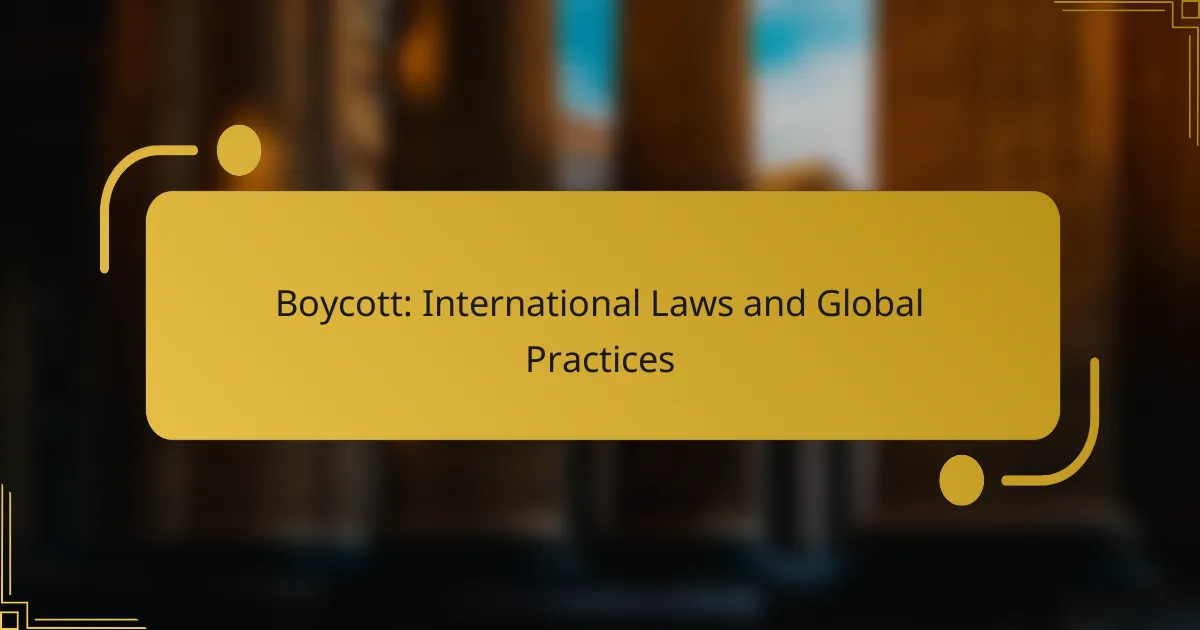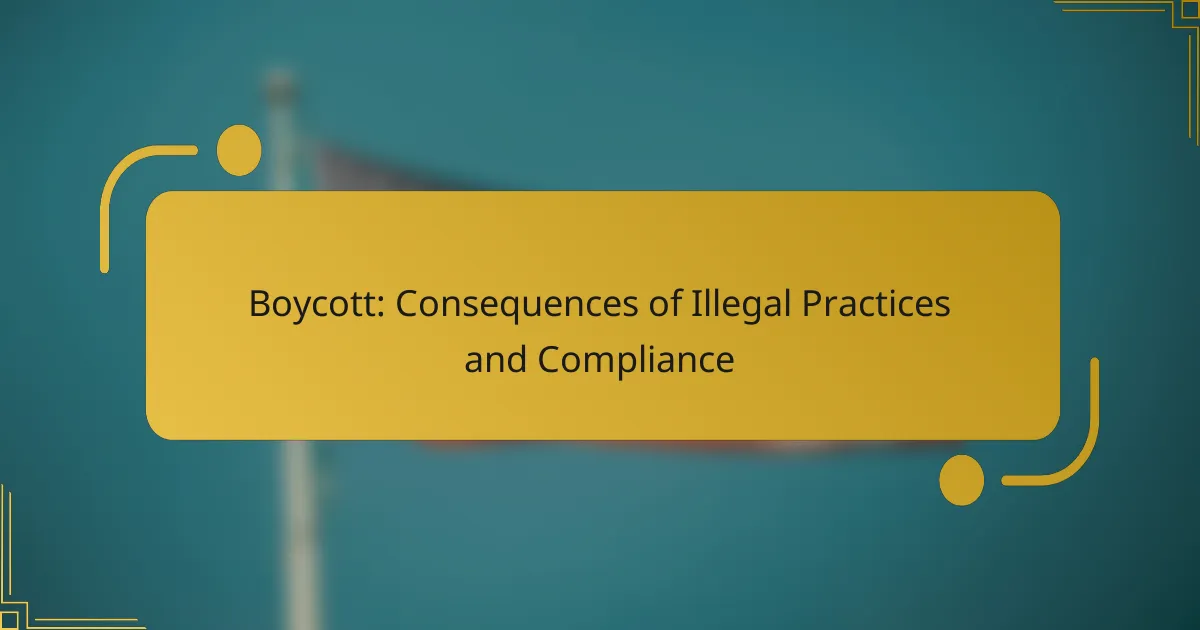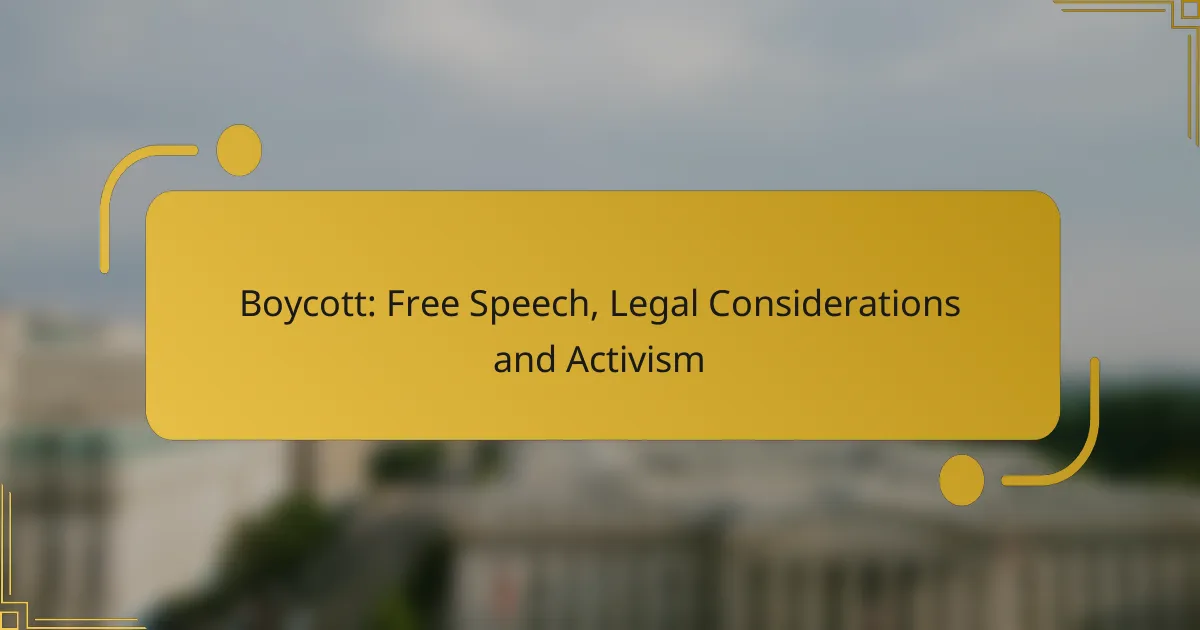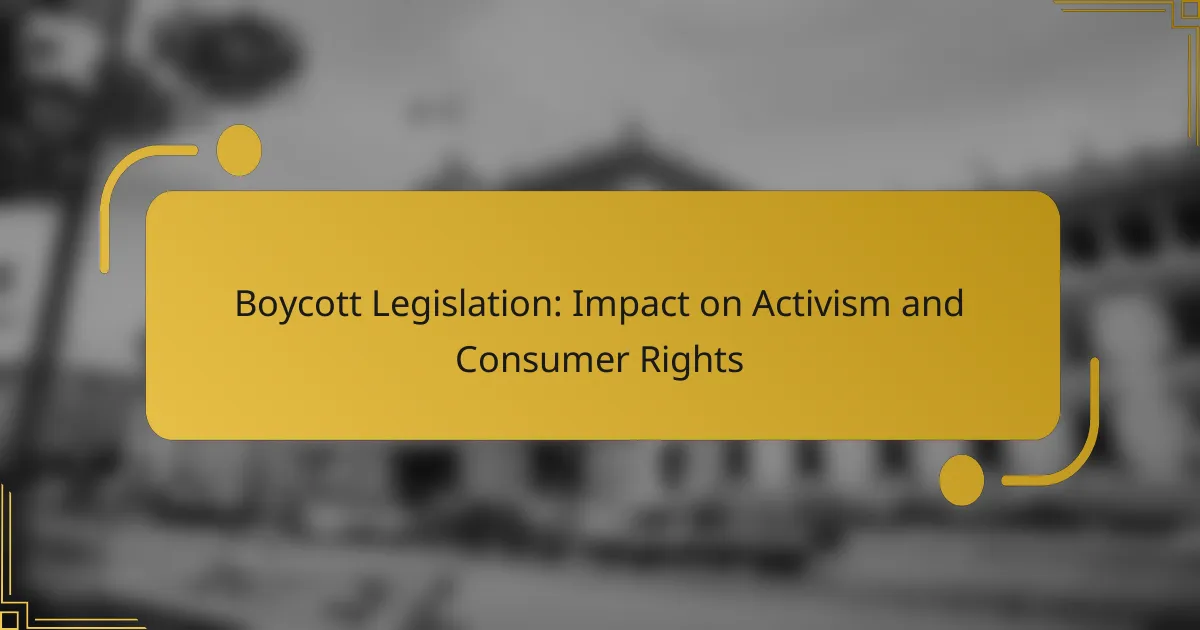Boycotts are powerful tools in international relations, governed by a complex web of laws and regulations designed to manage trade restrictions and sanctions. These practices, influenced by political motivations, can vary significantly in their implementation and effectiveness, often impacting diplomatic ties and global public opinion. As countries and organizations navigate these frameworks, the consequences of boycotts can resonate far beyond their immediate economic implications.
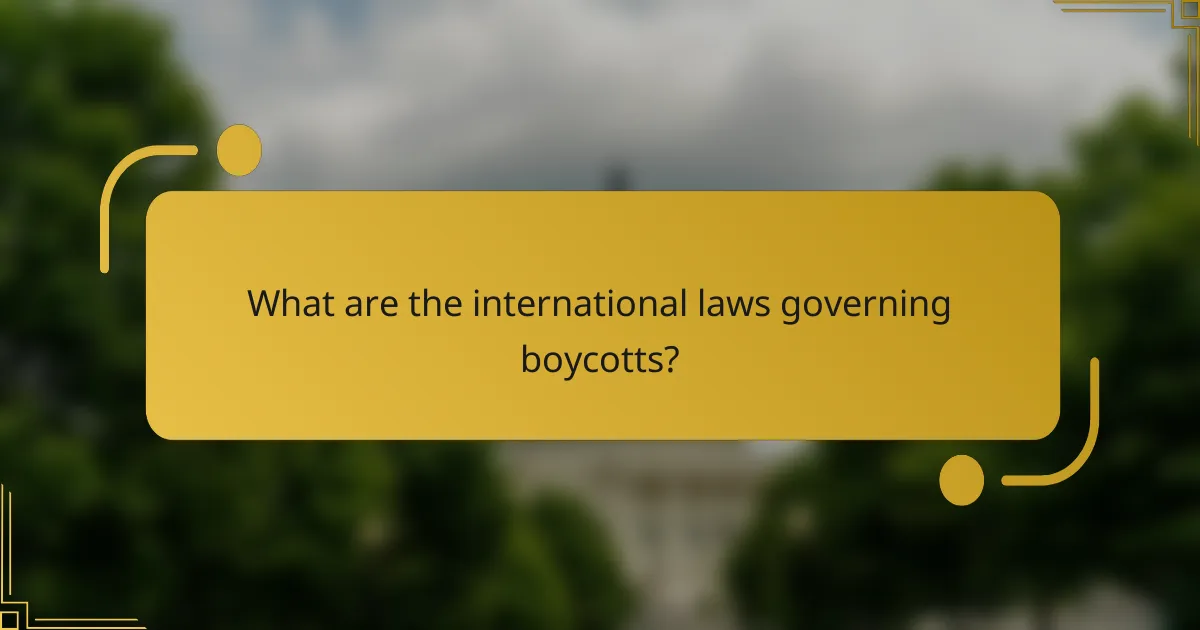
What are the international laws governing boycotts?
International laws governing boycotts encompass various regulations and guidelines set by organizations and countries to manage trade restrictions and sanctions. These laws aim to ensure compliance with international standards while balancing political and economic interests.
United Nations sanctions
The United Nations (UN) can impose sanctions on countries or entities that violate international laws or threaten global peace. These sanctions may include trade embargoes, asset freezes, and travel bans, effectively creating a boycott against the targeted nation or organization.
Countries are obligated to comply with UN sanctions, which can vary in scope and duration. For example, sanctions against North Korea have included comprehensive trade restrictions aimed at curbing its nuclear program.
European Union regulations
The European Union (EU) has established its own framework for implementing sanctions and trade restrictions, often aligning with UN measures. EU regulations can target specific individuals, businesses, or sectors, effectively creating a boycott to achieve political objectives.
For instance, the EU has imposed sanctions on Russia in response to its actions in Ukraine, which include restrictions on trade and investment in certain sectors. Member states must enforce these regulations uniformly.
US anti-boycott laws
The United States has specific anti-boycott laws that prohibit American companies from participating in foreign boycotts not sanctioned by the US government. This includes laws such as the Ribicoff Amendment, which targets boycotts against Israel.
Companies must report any requests to comply with foreign boycotts, and failure to do so can result in penalties. Businesses operating internationally should be aware of these laws to avoid legal repercussions.
World Trade Organization guidelines
The World Trade Organization (WTO) promotes free trade and discourages discriminatory practices, including boycotts that violate trade agreements. Member countries are expected to adhere to WTO rules, which aim to minimize trade barriers and foster fair competition.
Boycotts that are deemed to violate WTO agreements can lead to disputes and potential sanctions against the offending country. Understanding these guidelines is crucial for nations engaged in international trade.
International Human Rights laws
International Human Rights laws can influence boycotts, particularly when they are aimed at countries with poor human rights records. Activists and organizations may call for boycotts as a form of protest against human rights violations.
While these boycotts may not have formal legal backing, they can impact public opinion and lead to economic consequences for the targeted entities. Companies should consider the ethical implications of their business practices in relation to human rights standards.
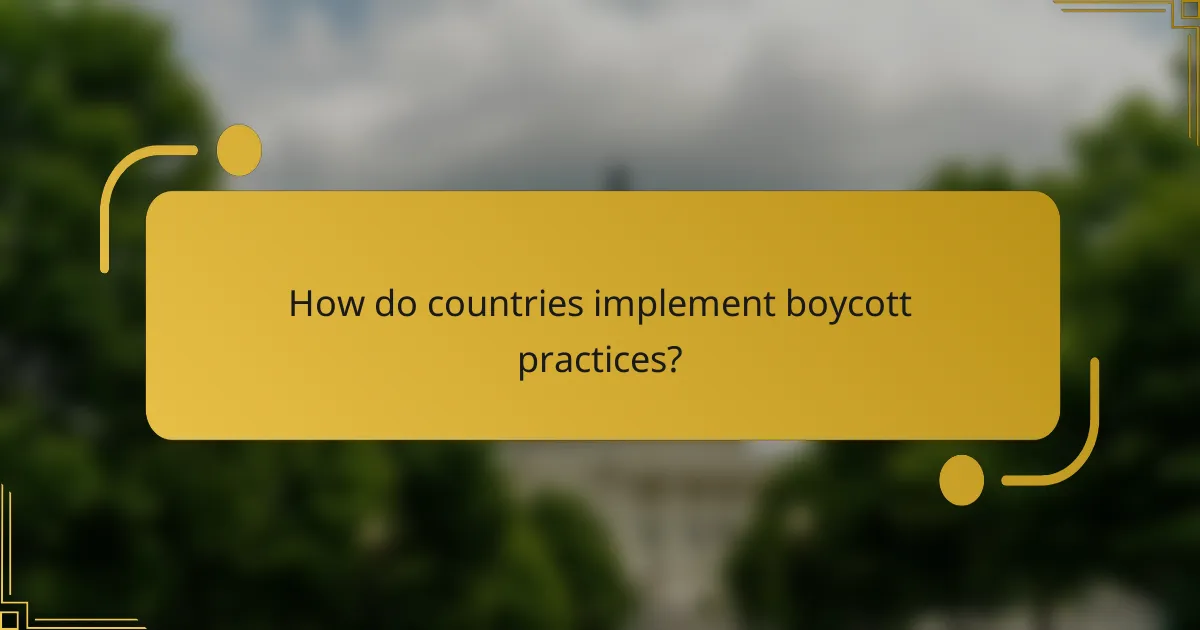
How do countries implement boycott practices?
Countries implement boycott practices through legal frameworks, diplomatic actions, and public campaigns aimed at discouraging trade or relations with specific nations or entities. These practices can vary widely in scope and effectiveness, often influenced by political motivations and international relations.
Case studies from the United States
The United States has a long history of implementing boycotts, often as a tool of foreign policy. Notable examples include the economic sanctions against Cuba, which have been in place for decades, and the boycott of South Africa during the apartheid era. These actions were intended to pressure governments to change their policies through economic isolation.
U.S. boycotts can be formal, such as those enacted by Congress, or informal, driven by public sentiment and advocacy groups. Businesses may also choose to boycott certain products or services in response to social issues, reflecting consumer values.
Boycott strategies in the European Union
The European Union employs a range of boycott strategies, often coordinated among member states to address human rights violations or geopolitical conflicts. For instance, the EU has imposed sanctions on Russia following its actions in Ukraine, which include trade restrictions and asset freezes.
In addition to governmental actions, civil society in the EU actively participates in boycotts, such as the Boycott, Divestment, Sanctions (BDS) movement regarding Israel. These strategies are often supported by public campaigns that raise awareness and encourage consumer participation.
Middle Eastern boycott practices
Middle Eastern countries frequently utilize boycotts as a political tool, particularly in relation to Israel. The Arab League has historically endorsed economic boycotts against Israel, which include restrictions on trade and investment. These actions are rooted in political solidarity and regional identity.
In addition to state-sponsored boycotts, local businesses may also engage in boycotts based on cultural or religious grounds. For example, some countries may discourage the purchase of products from nations perceived as hostile or disrespectful to Islamic values.
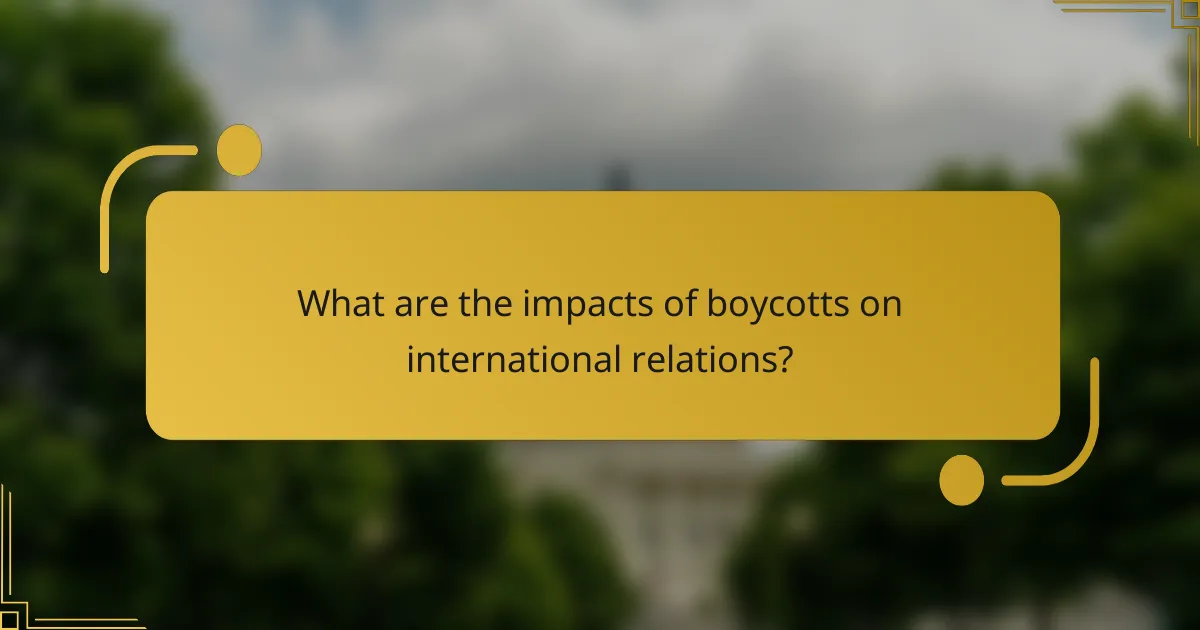
What are the impacts of boycotts on international relations?
Boycotts can significantly affect international relations by altering trade dynamics, influencing diplomatic ties, and shaping global public opinion. They often serve as tools for countries or groups to express discontent with policies or actions of other nations, leading to both intended and unintended consequences.
Economic consequences
Boycotts can lead to substantial economic impacts, particularly on the targeted country’s exports and imports. For example, a country facing a boycott may see a decline in trade revenues, which can affect its economy and employment rates. Conversely, the boycotting nation may experience short-term gains in domestic production but could face higher prices and limited choices for consumers.
Additionally, industries heavily reliant on international markets, such as agriculture or technology, may suffer more pronounced effects. Countries may also impose sanctions or tariffs in response to boycotts, further complicating economic relationships.
Political ramifications
Politically, boycotts can strain diplomatic relations and lead to increased tensions between nations. They may prompt retaliatory measures, such as counter-boycotts or sanctions, which can escalate conflicts. For instance, a boycott against a country for human rights violations might lead that country to withdraw from international agreements or alliances.
Moreover, boycotts can shift the balance of power in international organizations, as member states take sides based on their political interests. This polarization can hinder collaborative efforts on global issues like climate change or security.
Social movements and public opinion
Boycotts often emerge from social movements seeking to raise awareness and influence public opinion regarding specific issues, such as environmental concerns or labor rights. These movements can mobilize large segments of the population, creating pressure on governments and corporations to change their policies.
Public support for a boycott can vary widely, influenced by cultural, social, and economic factors. Successful boycotts often rely on effective communication strategies and grassroots organizing, which can amplify their impact and foster a sense of solidarity among supporters.
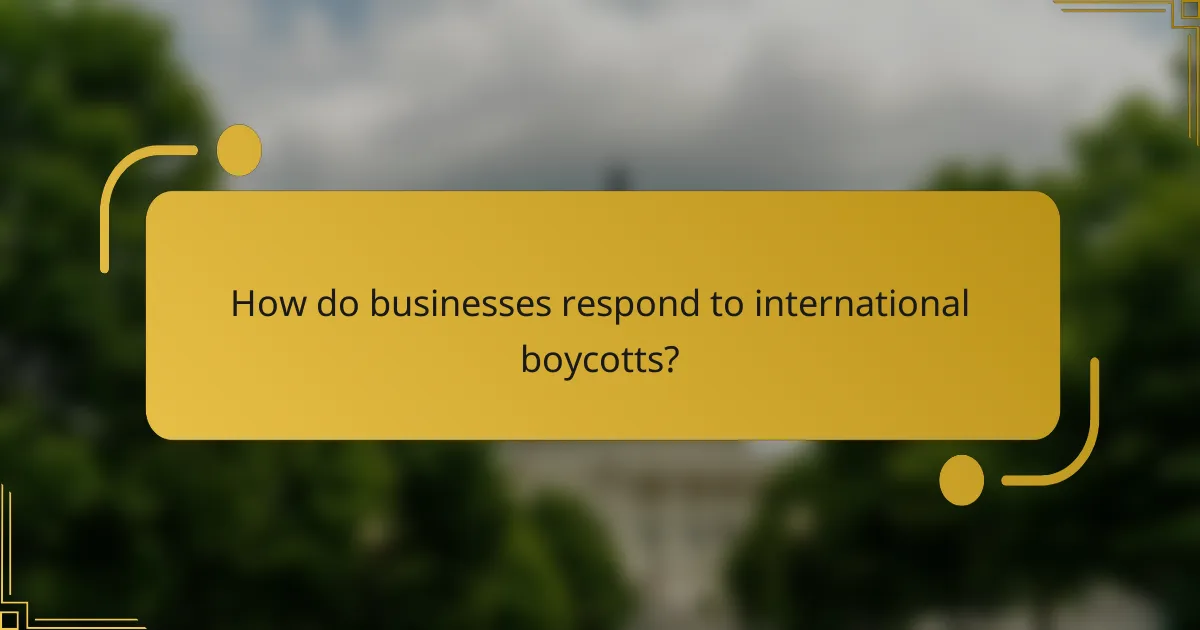
How do businesses respond to international boycotts?
Businesses typically respond to international boycotts through a combination of corporate social responsibility initiatives, public relations strategies, and legal compliance measures. These responses aim to mitigate reputational damage, maintain customer loyalty, and adhere to applicable laws.
Corporate social responsibility initiatives
Corporate social responsibility (CSR) initiatives are actions that businesses take to demonstrate their commitment to ethical practices and social values. Companies may enhance their CSR programs by supporting local communities, promoting sustainable practices, or engaging in charitable activities that align with their brand values.
For example, a company facing a boycott may increase its donations to humanitarian causes or launch campaigns that promote diversity and inclusion. This not only addresses the concerns of boycotters but also helps to rebuild trust with consumers.
Public relations strategies
Effective public relations strategies are crucial for businesses navigating international boycotts. Companies often issue public statements to clarify their positions, explain their actions, and engage with stakeholders. Transparency is key; businesses should communicate openly about their efforts to address the issues that led to the boycott.
Additionally, companies may utilize social media platforms to share positive stories and counter negative narratives. Engaging influencers or partnering with advocacy groups can also help reshape public perception and demonstrate a commitment to change.
Legal compliance measures
Legal compliance measures are essential for businesses to ensure they adhere to relevant laws and regulations during a boycott. Companies should conduct thorough assessments of their operations to identify any legal risks associated with the boycott and take appropriate actions to mitigate them.
This may involve reviewing contracts, adjusting supply chains, or ensuring compliance with international trade laws. Businesses must stay informed about legal developments in the regions affected by the boycott to avoid potential penalties and protect their interests.
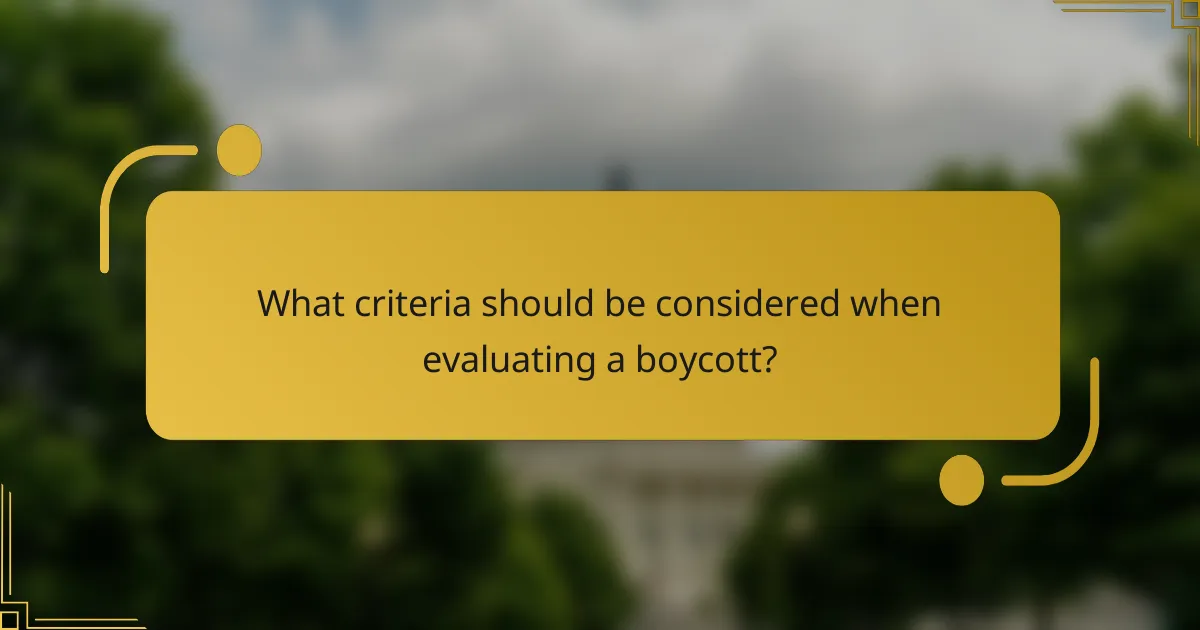
What criteria should be considered when evaluating a boycott?
When evaluating a boycott, consider its purpose, target, potential impact, and legal ramifications. Assessing these criteria helps determine the effectiveness and ethical implications of the action.
Legal implications
Legal implications of a boycott can vary significantly by jurisdiction. In some countries, boycotts are protected under free speech laws, while in others, they may face legal challenges, especially if they involve discrimination or anti-competitive practices.
It’s crucial to understand local regulations regarding trade and commerce, as violations can lead to penalties or lawsuits. For instance, in the United States, the Clayton Act addresses anti-competitive boycotts, while the European Union has specific rules against restrictive trade practices.
Ethical considerations
Ethical considerations in a boycott include assessing the motivations behind the action and its potential consequences on affected parties. A boycott aimed at promoting social justice may be viewed more favorably than one that seeks to harm a business for profit.
Transparency about the reasons for the boycott and the intended outcomes is essential. Engaging in dialogue with stakeholders can help clarify ethical stances and foster support, while avoiding misinformation is critical to maintaining credibility.
Effectiveness of the boycott
The effectiveness of a boycott often hinges on public awareness and participation. A well-publicized boycott can attract significant attention and pressure the targeted entity to change its practices, while a poorly organized effort may fail to gain traction.
Measuring success can be challenging; consider factors such as changes in consumer behavior, media coverage, and the response from the targeted organization. Setting clear goals and timelines can help assess whether the boycott is achieving its intended impact.
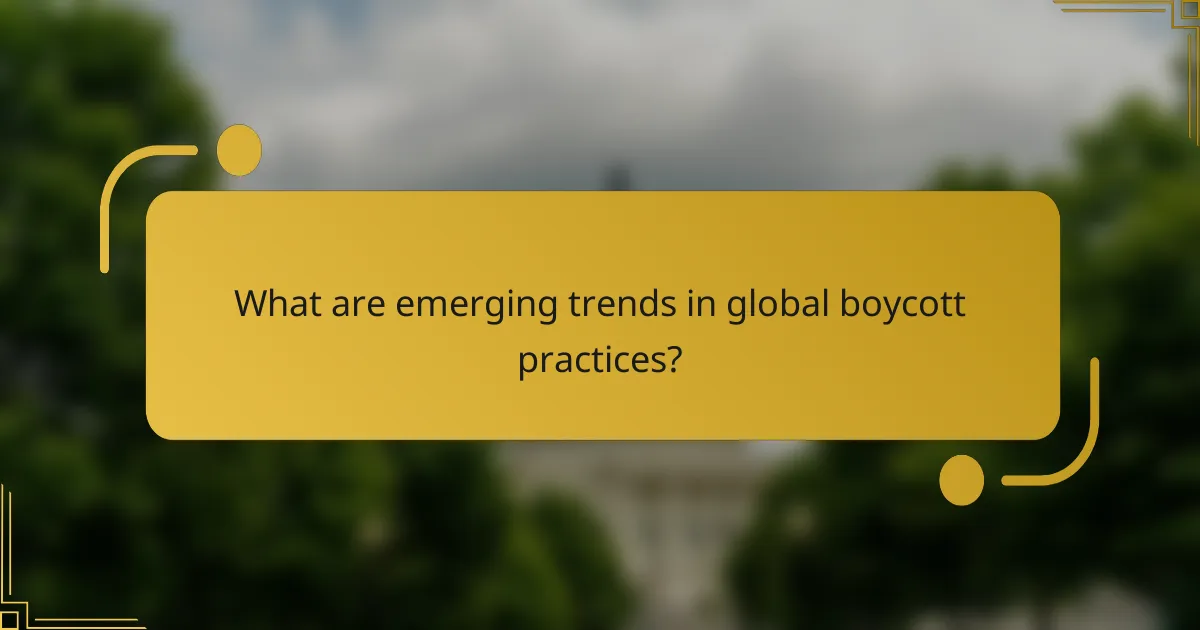
What are emerging trends in global boycott practices?
Emerging trends in global boycott practices reflect a growing awareness and activism around social, political, and environmental issues. These trends often leverage technology and collective action to influence corporate behavior and government policies.
Digital activism and social media influence
Digital activism has transformed how boycotts are organized and promoted, with social media playing a crucial role. Platforms like Twitter, Facebook, and Instagram enable rapid dissemination of information, allowing users to mobilize support and share their grievances widely.
Social media campaigns can quickly gain traction, reaching millions in a short time. For example, hashtags related to specific boycotts can trend globally, drawing attention to issues like labor rights or environmental concerns. This immediacy can pressure companies to respond swiftly to public sentiment.
However, organizations should be cautious about the potential for misinformation and backlash. Clear messaging and transparency are essential to maintain credibility and avoid alienating potential supporters. Engaging with followers and addressing concerns directly can help build a strong community around the cause.
